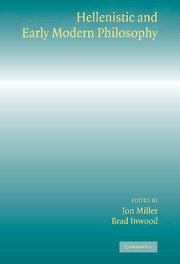Book contents
- Frontmatter
- Contents
- List of Abbreviations
- Notes on Contributors
- Preface
- Introduction
- 1 Stoicism in the Philosophical Tradition
- 2 Early Modern Uses of Hellenistic Philosophy
- 3 Locke's Offices
- 4 Patience sans Espérance: Leibniz's Critique of Stoicism
- 5 Epicureanism in Early Modern Philosophy
- 6 Stoics, Grotius, and Spinoza on Moral Deliberation
- 7 The Discourse on the Method and the Tradition of Intellectual Autobiography
- 8 Subjectivity, Ancient and Modern
- 9 Spinoza and Philo
- 10 Hume's Scepticism and Ancient Scepticisms
- 11 Stoic Naturalism in Butler
- Bibliography of Primary Sources
- Bibliography of Secondary Sources
- Index (general)
- Index (of selected text passages)
11 - Stoic Naturalism in Butler
Published online by Cambridge University Press: 05 August 2012
- Frontmatter
- Contents
- List of Abbreviations
- Notes on Contributors
- Preface
- Introduction
- 1 Stoicism in the Philosophical Tradition
- 2 Early Modern Uses of Hellenistic Philosophy
- 3 Locke's Offices
- 4 Patience sans Espérance: Leibniz's Critique of Stoicism
- 5 Epicureanism in Early Modern Philosophy
- 6 Stoics, Grotius, and Spinoza on Moral Deliberation
- 7 The Discourse on the Method and the Tradition of Intellectual Autobiography
- 8 Subjectivity, Ancient and Modern
- 9 Spinoza and Philo
- 10 Hume's Scepticism and Ancient Scepticisms
- 11 Stoic Naturalism in Butler
- Bibliography of Primary Sources
- Bibliography of Secondary Sources
- Index (general)
- Index (of selected text passages)
Summary
Naturalism and the Ancient Moralists
Joseph Butler (1692–1752) was not a prolific writer. His major work in moral philosophy, the Fifteen Sermons Preached at the Rolls Chapel, is always terse and often cryptic. He has been described as “the most sagacious, if not the most consistent or systematic, of the British Moralists.” But one systematic element in his moral outlook is his appeal to nature, and this element reasonably invites a comparison with Stoicism.
Butler's sermons are intended “to explain what is meant by the nature of man, when it is said that virtue consists in following, and vice in deviating from it, and by explaining to show that the assertion is true” (P 13). He says that this claim about nature is the view of the ancient moralists, but not the unanimous view of modern moralists. Some people simply reject it, while others regard it as trivial and useless, even if it is true (P 13).
He attributes the naturalist formula to “the ancient moralists” indiscriminately.
That the ancient moralists had some inward feeling or other, which they chose to express in this manner, that man is born to virtue, that it consists following nature, and that vice is more contrary to this nature than tortures or death, their works in our hands are instances. (P 13)
In the comparative expression “more contrary to this nature,” Butler suggests that torture and death are to some degree contrary to nature.
- Type
- Chapter
- Information
- Hellenistic and Early Modern Philosophy , pp. 274 - 300Publisher: Cambridge University PressPrint publication year: 2003
- 3
- Cited by



